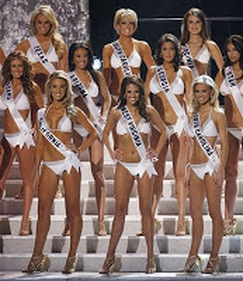 This past Father’s Day my family went to my grandparents’ house. After watching the US Open and America’s Got Talent, the Miss USA Pageant came on and we watched as each state’s representative came out and was judged and eliminated. I sort of felt like I was watching a helicopter crash…it was terrifying, yet I couldn’t look away. But what really interested me was my cousins’ responses. Alethea and Charis are ten and seven, and they were both fascinated by the show. As they were leaving (their dad good-naturedly joking about how he didn’t think they needed to watch any more of the show) Charis kept asking what channel it was on, presumably so she could continue watching when she got home (chances of that = not good…) Her response to the show reminded me of a quote from That Hideous Strength by CS Lewis, in which he discussed female beauty. He writes: Did men and women both feel interested in the female body and even, though it sounded ridiculous, in almost the same way? A sentence rose to her memory. "The beauty of the female is the root of joy to the female as well as to the male, and it is no accident that the goddess of Love is older and stronger than the god." (60) Charis was obviously thrilled by the beautiful women parading across the screen, and I realized that Lewis was right—beauty is just as, if not more, alluring to women as it is to men. A woman takes just as much joy in the female body as the man does, and it is no perversion that leads women to admire the beauty of other women. But there is definitely perversion of some kind involved in the hunger for beauty that fuels things such as the Miss USA Pageant. Otherwise why would there be such a culture of youth worship, eating disorders, consumerism and all the other stuff that eats away at women? Like Hannah said in her last post, we live in community, and what other people think matters to us. And since being thought beautiful by both men and women is important to girls, there is ample opportunity for perversions of both the standard of beauty and the means to achieving that standard. But does that mean that competitions like Miss USA are wrong? Should beauty be something that women are allowed to be good or bad at? Beauty—as our culture perceives it—has always been something you have or you don’t, but that is changing. If you aren’t educated, you can become educated. If you aren’t funny, or graceful, or musical, or talented you can work toward becoming more so. And now, if you aren’t beautiful, you can get plastic surgery or implants or botox. Is there a difference? I guess my real question is whether it’s okay to view beauty as something to be cultivated and judged, like anything else. In a culture of extremes, it’s probably safer to say it’s not okay. We’ve gone beyond viewing beauty as something you have or you don’t, and begun to go to whatever extremes possible to attain it. So does this mean we have to throw out the entire concept of beauty as pleasing? We can’t deny that every one of us has a built-in preference that tends toward beauty. Maybe the problem is that our perception of beauty has grown too narrow. We have turned into the shade in another work of CS Lewis, The Great Divorce, who runs and hides from the angels sent to escort her to heaven. Like her, our perception of beauty is too narrow to believe that we are capable of giving and taking joy in the way we were created, and we are left either flaunting our bodies, or hiding and saying, like her: "Can't you understand anything? Do you really suppose I'm going out there among all those people, like this? …How can I go out like this among a lot of people with real solid bodies? …Have everyone staring through me." (59-60) Maybe there’s nothing wrong with Charis admiring the women onscreen—there is certainly nothing unnatural about it. But there is so much more to be said and thought about when it comes to beauty and the way we treat it, that I feel like I’ve only just scratched the surface. There is so much pain involved in the concept of beauty and how to use and appreciate it that instead of the joy that should come naturally when we’re confronted with beauty, envy, pride and bitterness very often obscure it. And that is definitely not how it should be. ~Ruthie
0 Comments
Leave a Reply. |
Currently Reading
Open and Unafraid David O. Taylor O Pioneers! Willa Cather Archives
August 2020
Categories
All
|
